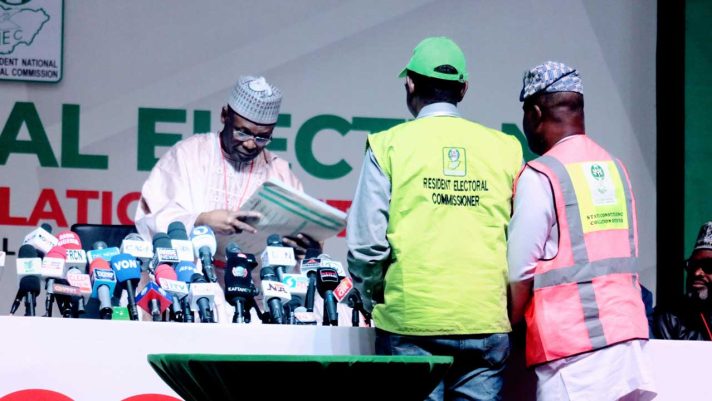PREMIUM TIMES EDITORIAL BOARD
In his acceptance speech, Tinubu promised “to be a fair leader to all”
President Muhammadu Buhari’s successor on the 29th of May is now known. He is Bola Ahmed Tinubu, the All Progressives Congress (APC) candidate in the 25 February presidential election. The Chairman of Independent National Electoral Commission (INEC), Professor Mahmood Yakubu, who was also the national Returning Officer, declared him the winner of the poll on Wednesday, 1st of March, having polled the majority of lawful votes cast. He got a total of 8,794,736 votes to beat 17 other opponents.
He was trailed by Atiku Abubakar of Peoples Democratic Party (PDP), with 6,984,520 votes; Peter Obi of Labour Party (LP), who polled 6,101,533 votes; and Rabiu Kwankwaso of New Nigeria Peoples Party (NNPP), having 1,496,687 votes. Tinubu did not only score the highest number of votes but also at least 25% of the votes in 30 states, out of the 36 states of the federation and the Federal Capital Territory, Abuja, to gain the national spread, a constitutional requirement to become President-elect. The law stipulates at least a 25% benchmark of votes in 24 states. Tinubu won the highest number of votes in 12 states, just as Atiku and Obi equally did, when the FCT is added. Kwankwaso won the most votes only in Kano State.
In his acceptance speech, Tinubu promised “to be a fair leader to all”, and that he “will be in tune with your aspiration.” These are niceties in a seemingly social contract with the people. Ultimately, he extended the olive branch to his fellow contestants in an election that has gone down in our history as the most competitive since the First Republic.
The President, in his congratulatory message to Tinubu, lauded him as the best man for the job. He was pleasantly surprised at the poll’s competitiveness, which he viewed as evidence of the deepening of democracy in the country. He said, “Never has the electoral map shifted so rapidly in one cycle. In the presidential election, states in all regions across the nation changed colour,” referencing his home state of Katsina, and Lagos State, won by Atiku and Obi respectively.
However, none of the three major challengers has congratulated Tinubu in line with global democratic tradition. This is understandable. The PDP, LP, NNPP and others protested over the integrity of the results, while the collation was still ongoing on Monday, and they walked out of the collation centre. The parties accused INEC of breaching a critical provision in the Electoral Act, 2022, as amended. Shortly after, the Labour Party at a conference said it was headed for the court; the PDP has articulated a similar resolve.
At issue is the failure of INEC to use the Bimodal Voter Accreditation System (BVAS) to upload the results on its portal from screenshots of the signed result sheets given to all party and security agents. The electoral body attributed this to technical glitches after 24 hours of the polls, following public outcry. The provision was made to correct the errors in previous elections in the country and to guarantee the integrity of subsequent ones. The Electoral Act, in Section 64, (4) states that, “A collation officer or returning officer at an election shall collate and announce the result of an election subject to his or her verification and confirmation that the – (a) number of accredited voters stated on the collated result are correct and consistent with the number of accredited voters recorded and transmitted directly from polling units under section 47 (2) of this Act.”



